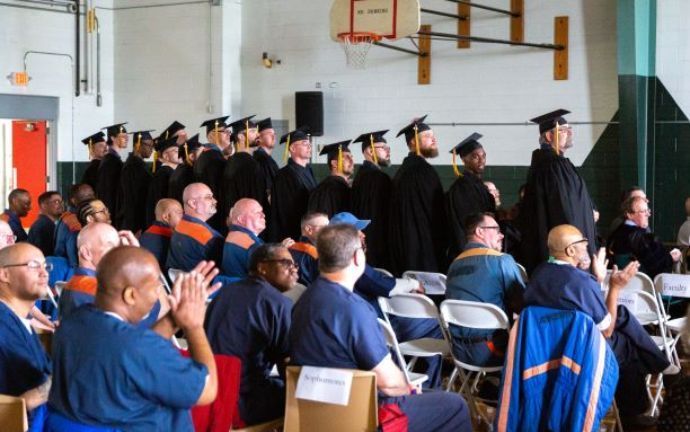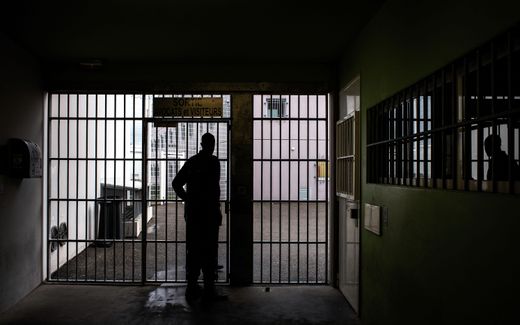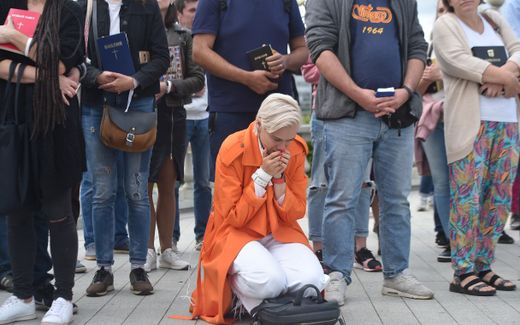American detainees achieve academic degree
25-02-2023
Christian Life
Wim Kranendonk, RD

Graduating class in the Richard A. Handlon Correctional Facility in Ionia. Photo Calvin University
Christian Life
"I have to hurry up because I have to go to jail", Professor Micah Watson from Grand Rapids says at the end of the conversation. Why does a respected professor have to go behind bars? "I enjoy being there."
Once a fortnight, Watson goes to the Richard A. Handlon Correctional Facility in Ionia, a drive of approximately 45 minutes east of Grand Rapids. Behind bars, he teaches the course political philosophy – just like he does at Calvin University.
His students in Ionia all wear the same uniform, blue with a broad orange band on the shoulders; the outfit of all prisoners in Handlon. "In prison, my public is very engaged", Watson says. "It is a group which I teach with pleasure. There are no problems with the order in class, and the students listen very well."

Watson is one of the professors involved in the "Calvin Prison Initiative" (CPI), which was initiated in 2015. The project is an initiative from Calvin University and Calvin Theological Seminary in cooperation with the jail system in the American state of Michigan. The project gives detainees the chance to study and achieve an academic degree while being imprisoned.
The classes are all taught behind bars. Professors from Calvin University come to Ionia to give lectures and take exams. "There is an oversupply of lecturers who want to do this", Watson says. "I feel privileged to be allowed to do this work."
Perspective by enrolling in thorough study
The goal of CPI is to offer detainees perspective by allowing them to enrol in a thorough study. When they achieve a recognised degree, they increase their chances in the labour market after release. That would decrease their likelihood of recidivism.

Not only prisoners who will be released after some time are allowed to enrol in the CPI program. Two-thirds of the students received a life sentence. Watson: "At first, the prison management only wanted to select prisoners for the program if they would be released within a few years. But Calvin said immediately that those with a life sentence should also be offered this chance. They are also people created after God's image and who are valuable to Him, despite their sins and crimes. If they finish their study, they can be useful in prison."
Now, anyone from the prison in Ionia knows that the CPI participants positively influence life behind bars. "The harsh culture common in prisons becomes more human", Watson says. "That is also what the study program aims for. Because in addition to the lectures that the students can follow on campus in Grand Rapids, CPI offers personal development training. There, students learn how to deal with their emotions."
Improved culture in prison
The latter was also an important motivation for the initiators of CPI. They got the idea to start the project after some professors from Calvin paid a visit to the Angola Penitentiary, an infamous male prison in Louisiana. A significant decrease in violent incidents was seen after a study program was started.
"We want to do a similar thing in Michigan", the professors said on their way back. With the university's support and particular sponsors, they could start an educational program for a group of twenty detainees a year. In 2020, the first group received their bachelor's degree.

Michael Duthler – now in his forties - is one of the graduates. In the early 90s, he made Grand Rapids unsafe as a criminal gang member. He was involved in a murder of a member of a rival gang and was arrested. On November 5, 1992, he received a life sentence because of his involvement in the murder and possession of firearms. The verdict, however, did leave the possibility for his conditional release.
In 2016, Duthler started his study. At first, he was hesitant. Growing up in Grand Rapids, he knew that Calvin had strict rules. How would the Calvin professors behave in prison? Would he still be safe in prison, or would he have to be cautious all the time in case a jealous fellow inmate wanted to attack him? After another prisoner told him he should do it, he registered. And his registration was honoured. Duthler belonged to the twenty selected inmates.
Called by name for the first time in twenty years
"I did not believe what was happening", he said during his graduation. "Just the atmosphere in the classroom was already a relief. In prison, you are called by your number; during the classes, I was called by my name. I had not experienced someone calling me Mike in over twenty years. And we were allowed to use computers freely. Wonderful. But the best part was that life became meaningful again. Not only because knowledge was transferred, but especially because life's deepest questions were discussed in class. The Bible was opened, and hands were folded at the beginning of the lessons. That made an impression and released a lot of tension. After we had prayed for the first time at the start of the lessons, I could not go on. I had to cry. I hadn't done that in twenty years."

Todd Cioffi, director of the CPI, is proud of the project. "It gives prisoners hope again." He says some graduates have now found jobs after leaving Handlon Prison. "Often, it is extremely difficult for ex-prisoners to find work. Nobody wants them. These graduates have found work fairly easily. Companies and institutions are often impressed that these men managed to get a degree in difficult circumstances."
Most graduates will never be released. "But within the prison, they can work. They help fellow prisoners with physical, mental or cognitive disorders. They give courses on how to overcome addiction, they translate if necessary and not infrequently, and they lead religious meetings or Bible study groups. This is important work because half of the prisoners have mental health problems."
Related Articles





